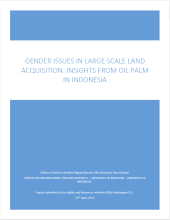Land Library
Welcome to the Land Portal Library. Explore our vast collection of open-access resources (over 74,000) including reports, journal articles, research papers, peer-reviewed publications, legal documents, videos and much more.
/ library resources
Showing items 1 through 9 of 101.This publication is based on a range of past studies on ICCAs conducted in several regions of the world in the last two decades, and, most recently, on 19 country level case studies.
The oil palm boom in Indonesia continues to be a major driver of land acquisitions in remaining tropical forest frontiers, drawing on a wide range of actors into its production, and transforming both rural landscapes and livelihoods in the process.
Women face many problems with regard to land inheritance and land rights in Kenya. Individual and community land ownership do not favour women. The reason for this is that ownership of land is patrilineal, which means that fathers share land amongst sons, while excluding daughters.
While women’s rights to land and property are protected under the Kenyan Constitution of 2010 and in various national statutes, in practice, women remain disadvantaged and discriminated.
Globalisation and urbanisation trends in developing countries present both opportunities for growth and development on one hand while contributing to the complex myriad challenges of managing urbanisation on the other hand. Cities and urban areas play a critical in the development of a country.
This paper describes the development of a Land Information Management System (LIMS) for County Governments in Kenya. In the new Constitution 2010, devolution of some national government functions and formation of county governments was provided for.
The need for affirmative action and the mainstreaming of the commons community plus a comprehensive strategy to secure indigenous and community land has become a major global concern of the 21st century.
Land Registration and Administration in Kenya is currently operated on a multi-legal platform [UN 2013]. The Land Registration Act No. 3 of 2012 (LRA) was in that regard enacted to consolidate, harmonize and rationalize land registration goals; which are yet to be achieved.







